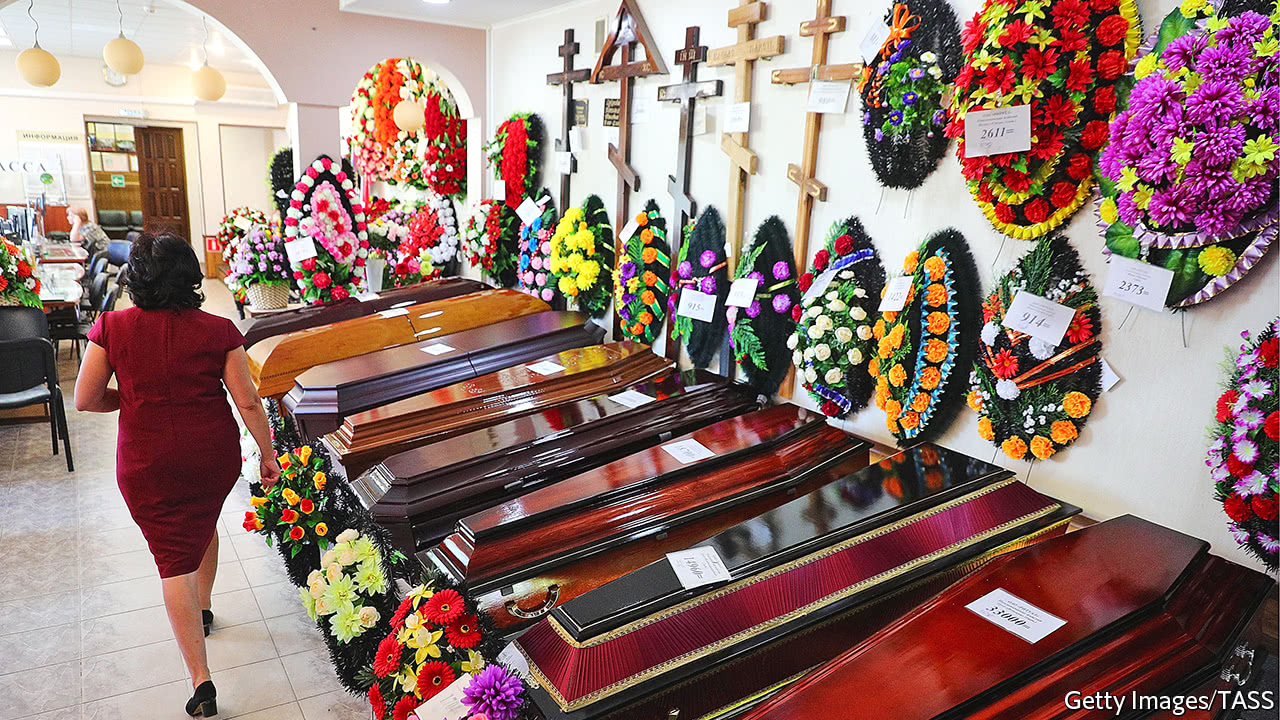
THE calls began shortly after Yulia’s grandmother died. The undertaker offered help arranging the funeral, for 47,000 roubles ($800) in cash. She then travelled to Moscow’s Khovanskoe Cemetery, where she was offered a discount on a gravesite—150,000 roubles off—if she could bring cash within three hours and sign a receipt saying she had paid half that amount. Yulia (whose name has been changed) and her family gave in. “We knew we were paying a bribe, but what else could we do?”
To bury a loved one in Russia often means entering an underworld of corruption and red tape. The myriad goods and services needed, from preparing the body for burial to funeral arrangements to carving a headstone, all represent opportunities for extortion in a largely informal market. “Instead of a funeral as a commercial service, the consumer is offered a strange sort of quest,” writes Sergei Mokhov, editor of The Archaeology of Russian Death, an academic journal. Official spending on funeral services reached some 58bn roubles in 2016. But most of the market—another 120bn-150bn roubles—remains in the shadows, according to official estimates.
Change may be afoot. President Vladimir Putin in August directed his government to clean up the industry. The authorities want to bring revenues into the light and under control of state firms, such as GBU Ritual, a large provider in Moscow. “Earlier when there was lots of oil money, no one wanted to bother with foul-smelling funerals,” notes Mr Mokhov, but now the state is looking for resources. An unintended consequence may be to allow more space for entrepreneurs, who see opportunities to disrupt Russia’s most archaic sector. “This is practically the last sphere to go through a market transition,” says Oleg Shelyagov, owner of Ritual.ru, an innovative funeral-services provider in Moscow.
Russia’s history has shaped the industry in unusual ways. Under the tsars the church oversaw most funerals and cemeteries. The Bolsheviks nationalised church land and property, abolished traditional rituals, and decreed that all citizens must have identical funerals. In practice, however, the Soviet authorities paid little attention to burial practices.
After the Soviet Union’s collapse “absolute bacchanalia” and “absolute banditry” took hold, says Vladimir Panin, director of STIKS-S, one of Moscow’s oldest funeral bureaus. Over time some 20 firms, including Mr Panin’s, became “specialised city services”, or privately owned firms that the city licenses as funeral providers in return for a small stake (no less than 5%). These firms developed a simple business strategy, paying rent to hospitals and morgues for offices on the premises, then waiting for the inevitable appearance of clients. (The city received shares in the firms in exchange for offering access to state infrastructure.)
RIP-off
Their main competitors have long been “black” agents—independent operators who buy information on recent deaths from police, medical and morgue employees (the going rate in Moscow for this kind of intelligence is 20,000 roubles). These agents thrust themselves upon relatives of the deceased, often showing up at home offering help with documents, coffins and arrangements. They often price services “by the boots”—estimating from the client’s appearance how much they can pay.
Problems mounted for years with little government response. The last notable law on the industry passed in 1996. Oversight has been minimal. But Mr Putin’s order, and a run of scandals, including a brawl over turf that left three dead and dozens wounded at Moscow’s Khovanskoe Cemetery in 2016, gave impetus to talk of reform. Officials speak of raising standards, banning funeral agents from morgues and hospitals, and digitising services.
A handful of newer players have emerged, hoping to speed the industry’s transformation. Mr Shelyagov, a former banker, acquired a controlling share in Ritual.ru in 2016 and set out to modernise things. Rather than purchasing death notices or setting up shop in morgues, Ritual.ru aims to attract customers with a competitive product and strong branding. He talks of becoming the “Coca-Cola in this market”, but admits that marketing funeral services is a challenge. “What are you going to do, put an ad up for cheap coffins?”
Ritual.ru has developed two in-house apps: one, inspired by Uber, connects its network of funeral agents with incoming orders; a second contains a catalogue where customers can choose coffins, wreaths and other services, with fixed prices and the option to pay by credit card. “Everyone is afraid to call this business a business,” says Mr Shelyagov. “But it’s no different from any other.” Another firm, Chestniy Agent (meaning Honest Agent), employs drones to map cemeteries, most of which have few or no records, to find space; their app links agents with suppliers for coffins and headstones.
Entrepreneurs and established companies must nonetheless contend with an expansionist GBU Ritual. In 2015 it went beyond controlling city cemeteries, also taking over spaces in morgues and hospitals to offer funeral arrangements. “Why are there changes? Because someone wants to eat,” laments Mr Panin, gazing at two shark heads perched on the shelves of his opulent office. His company, until recently one of Moscow’s largest funeral agencies, is under strain. “Back in the ’80s and ’90s there were bandits,” he says. “Now there are the state structures.”
Source: economist
Russia’s dysfunctional funeral business gets a makeover